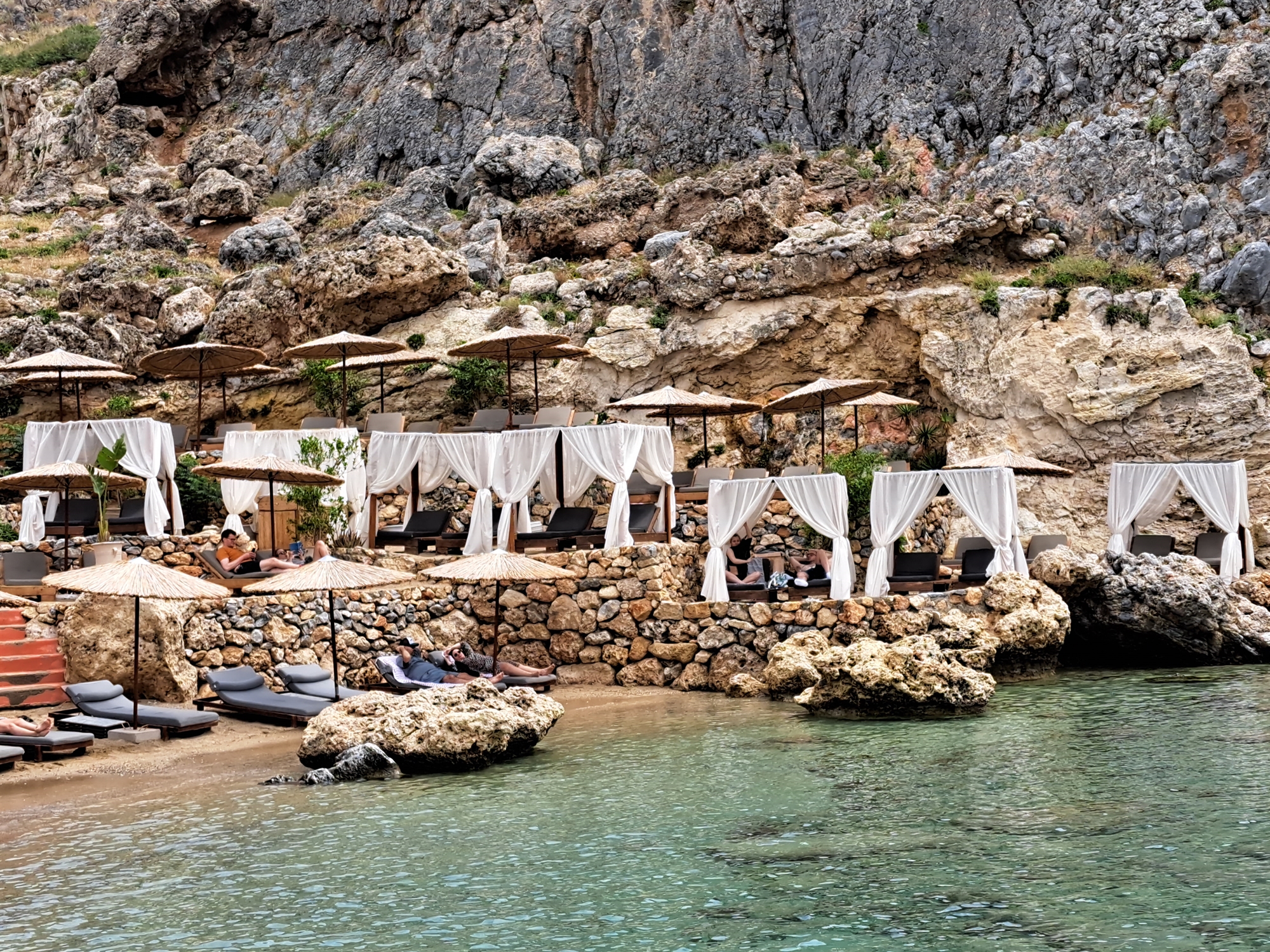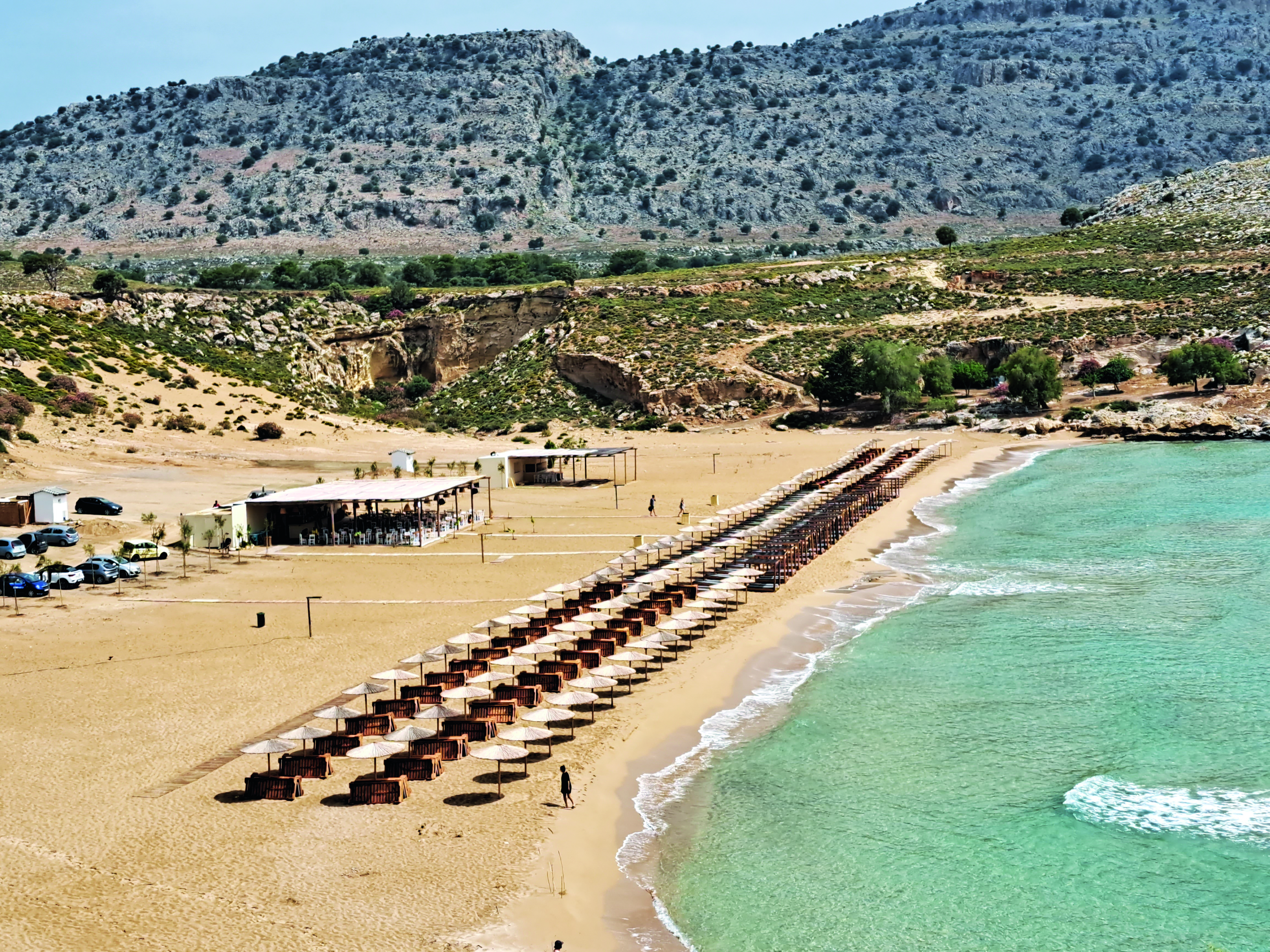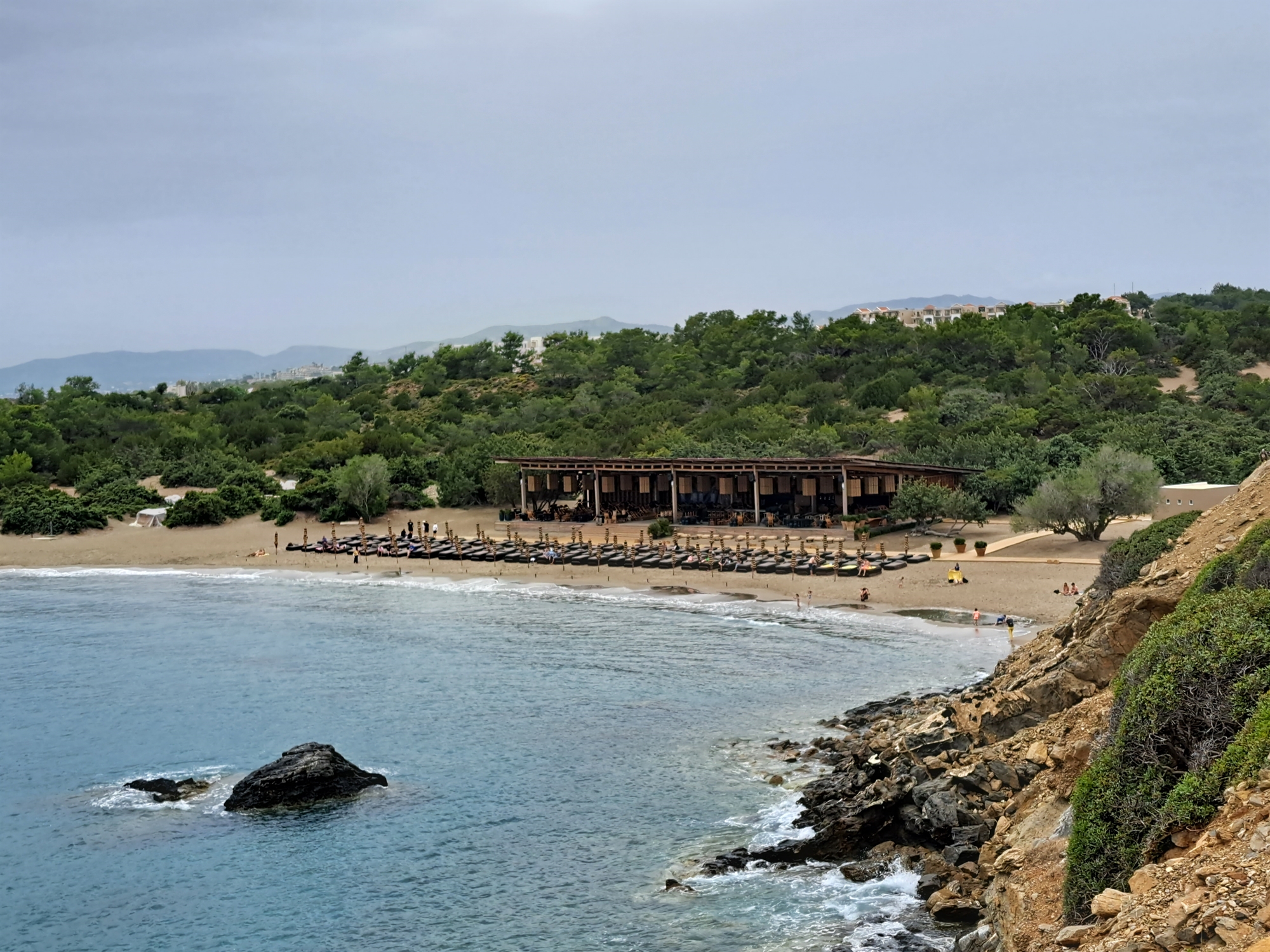
There are many words that could describe the situation on the beaches of Rhodes. But how to characterize the island, on which the land administration issued more than 650 protocols for the demolition of unauthorized buildings on the seashore and beaches, of which only one was executed. Over the past two years, impunity has led to deforestation when the land, archaeological and forestry authorities failed to enforce the law, there was no decentralized administration, and the court asked the mayor of Rhodes to explain the fact that they should not apply sanctions. apply to illegal shops.
Image one, Glystra
Glystra beach in Lardos bay is located on the eastern side of the island, about 55 km south of Rhodes town. The beach in the less touristy southern part of the island was the perfect choice for the people of Rhodes. It is sandy, next to the road, and its many protections (like an archeological site and a forested area with a beautiful cedar forest) have ensured that it retains its natural beauty.
But this situation was not to last forever. At the beginning of 2019, an illegal dining room was installed at one end of the beach, which “sheltered” its space with tables and a canopy. In February 2021, construction began on an oversized building at the other end of the beach. The work was noticed and shortly thereafter, on February 26, the Ephorate of Antiquities issued a notice of termination. Subsequently, on March 1, the Dodecanese Real Estate Service compiled the first autopsy report, from which the occupation of 317 sq.m. on the seashore and 618 sq.m. on state property (owned by Public Real Estate). On June 11, the same agency issued a demolition protocol, and the respective protocols were issued by the Rhodes City Planning Authority (August 2021) and the Dodecanese Forestry Authority (November 2021).
But the work went on. Sand dunes were smoothed, local cedars were cut down, and the beach bar was open as usual. In February 2022, urban planning returned with a new protocol as construction expanded. The Rhodes District Attorney’s Office was forced to demand 24/7 security guards to stop the building from expanding, with the district and municipality refusing to participate in the demolition or removal of the bar’s equipment under various pretexts. It should be noted that all criminal cases and protocols were drawn up against an unknown perpetrator, since the workers who were arrested from time to time in the process of self-immolation did not “name” their employer. After the end of protection, construction resumed.
In 2021, the Aegean Decentralized Administration held a tender to find a demolition contractor. The competition was declared invalid as no one performed. The tender was repeated, an interested party was found, which suddenly changed its mind and withdrew. This was followed by a two-year moratorium imposed by the government on all demolitions in coastal areas, which created “fertile” ground for illegal activities throughout Greece.
And we come to today. In May 2023, the Dodecanese Ephorate of Antiquities issued another termination notice. Because the paving of the road leading to the beach. The result of three years of efforts by the Administration? The beach bar, a huge structure reaching a height of five meters, is back in business this year.

Image two, Lindos
The Acropolis of Lindos is one of the most famous monuments of the island and one of its most beautiful places. Its protection back in 1960 greatly contributed to the preservation of not only the monument itself, but also the surrounding landscape. But at the foot of the cliff, next to the sea (and within the archaeological excavations) there is an orgy of arbitrariness: both on the central beach (Megalos Gialos) and on the back side (Mikros Gialos and Agios Pavlos beach).
In Mikro Gialos, in 2021, an unlicensed business established there began clearing snow to form decks for sunbeds and tables. The Ephorate of Antiquities issued notices of termination and filed lawsuits, the Real Estate Service issued protocols on administrative expulsion in 2017, in 2022 all buildings were recognized as unauthorized and subject to demolition. 20 days ago, the company that manages the site started building a wooden jetty in the sea – a demolition protocol has already been drawn up. Business is operating normally.
Opposite is the beach of Agios Pavlos. From the opening of antiquities by Ephorat, it was established that since 2021, unauthorized construction work and the installation of wooden shelters have been carried out. The beach was transferred to the use of the municipality without the approval of the Ephorate of Antiquities, despite the fact that it is located on an archaeological site.
Of the 650 protocols on the demolition of unauthorized buildings on the shores of the seas and beaches, issued over the past 30 years on the island, only one has been executed.
In Megalo Gialos, the central beach of Lindos, a famous restaurant has been arbitrarily demolished since 2010, but it is still operating as usual. The Ephorate of Antiquities has issued cease-and-desist notices from 2022 for the installation of wooden sheds and containers on a private site located within the archaeological site.
Image three, Agia Agati
The beach of Agia Agati in the area of Haraki is located on the territory of archaeological excavations (zone A). Since 2021, two containers have been illegally placed on the beach, with wooden sheds built in front of them. Also, the Ephorate of Antiquities discovered that the mouth of the Agios Nikolaos stream, which is in contact with the ancient monument (part of the ancient bridge), was filled up. “Violations are repeated continuously every year at the beginning of the summer season. (…) The silting up of the stream affects its natural course. As a direct consequence, during the winter months, its course shifts towards the ancient monument, contributing to ever-increasing, immediate and irreversible damage,” the April 2022 document says. demolished. However, squatters operate normally and exploit the beach without permission.

To Parliament
These three cases are “illustrative” as over the past two years they have opened up a discussion in the island’s society about the loss of all restrictions (some of them even reached Parliament with questions from MeRA25 and SYRIZA). However, they represent a very small part of the general situation of arbitrariness reigning on the island. According to the Dodecanese Land Survey, more than 650 unauthorized demolition reports have been issued on the coasts and beaches of Rhodes over the past three decades, of which one was executed (because a third party covered the costs, as was done 15 days ago in Mykonos). Moreover, the situation seems to be spinning out of control at all levels. In August 2022, a citizen who was actively speaking out against wrongdoing on Agatis Beach was attacked (the case went to court), and this year a curator of antiquities was raped while checking a shop in a rented monument in Rhodes (lawsuits were initiated). also filed).
In contrast to Mykonos, in Rhodes the situation began to disturb society. “These abuses were not committed in secret, by the light of the moon. They walked during the day and built, erected, dug, carved. The question of everyone on the island is how is it that the Greek state cannot impose itself illegally. Trust in institutions is at stake,” says lawyer Christos Maliarakis, President of the Rhodes International Culture and Heritage Society (RICHeS).
“There used to be problems. But now the degree of arbitrariness has changed,” assesses Yakovos Grillis, architect and former president of the TEE Dodecanese. “Despite the fact that the services have done their job, nothing is being done, there is impunity. citizens, unfair competition arises for those entrepreneurs who are legitimate. First of all, there is a pervasive fear that if you talk, you will get into trouble.
“The phenomenon is not new, it’s just happening more openly now than ever,” says Kostas Shinochoritis, president of the Dodecanese Association of Architects. “No one says anything. For the municipality of Rhodes and urban planning, it’s like it doesn’t exist.”
For his part, the mayor of Rhodes, Antonis Kambourakis, argues that the island is ruled by law. “The South Aegean region is very successful, it ranks first in Europe in terms of development. We must treat Roditis like an Akrita and a Greek. Punishing him is not good, because the island prospers, prospers, constantly increases its population. It’s a bad expression of “Greek greatness” to try to destroy a champion to satisfy other instincts. Islands such as Mykonos, Santorini and Rhodes make Greece famous all over the planet and cannot be left behind by minorities. As far as the issues that are being complained about, we have an excellent prosecutor in Rhodes who is doing a great job. From end to end, the island is characterized by legality.

Criminal prosecution
However, according to “K”, important events are coming. On Monday, the Rhodes Prosecutor’s Office of First Instance opened criminal cases against the Quality of Life Committee of the Municipality of Rhodes and Mayor Antonis Kambourakis for dereliction of duty (for example, for not proceeding with the closure of all illegal businesses), for the beach front within the city of Rhodes. A preliminary investigation into relevant omissions regarding stores of health interest located on the beaches in the rest of the island is pending. In addition, both the Decentralized Administration and the Dodecanese Real Estate Service are tested with a separate dossier on their actions and inactions. At the same time, under automatic procedure, shop managers across the coastline of the island are arrested every day and criminal cases are brought against them. Also over the past year, the prosecutor’s office of first instance filed several appeals against court decisions that justified the heads of beach shops that operated on the territory of archaeological sites without the consent of the Ephorate of Antiquities. The volume of cases created by the prosecutor’s office is huge – it is necessary that the cases reach the courts.
Source: Kathimerini
Ashley Bailey is a talented author and journalist known for her writing on trending topics. Currently working at 247 news reel, she brings readers fresh perspectives on current issues. With her well-researched and thought-provoking articles, she captures the zeitgeist and stays ahead of the latest trends. Ashley’s writing is a must-read for anyone interested in staying up-to-date with the latest developments.